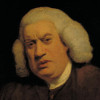“ The sensible world, on the contrary, is imperfect, but it has life, desire, thought of an imperfect kind, and aspiration. ”
Bertrand Russell, A History of Western Philosophy (1945). copy citation
| Author | Bertrand Russell |
|---|---|
| Source | A History of Western Philosophy |
| Topic | desire aspiration |
| Date | 1945 |
| Language | English |
| Reference | |
| Note | |
| Weblink | http://www.ntslibrary.com/PDF%20Books/History%20of%20Western%20Philosoph... |
Context
“I said that Aristotle was not by temperament deeply religious, but this is only partly true. One could, perhaps, interpret one aspect of his religion, somewhat freely, as follows:
God exists eternally, as pure thought, happiness, complete self-fulfilment, without any unrealized purposes. The sensible world, on the contrary, is imperfect, but it has life, desire, thought of an imperfect kind, and aspiration. All living things are in a greater or less degree aware of God, and are moved to action by admiration and love of God. Thus God is the final cause of all activity. Change consists in giving form to matter, but, where sensible things are concerned, a substratum of matter always remains.”
source


